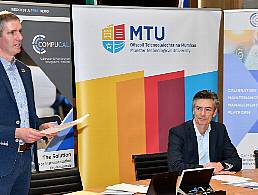If CEOs can recognise their own limitations and take breaks when necessary, the whole organisation benefits, says talent expert Barry Guiney.
“The traditional leadership paradigm has changed,” says Barry Guiney, the COO of global executive talent and leadership advisory firm Odgers Berndtson Ireland. CEOs, be they new to the role or established, are working in a complex landscape that “requires additional competencies and attributes in order to succeed”.
Guiney says it is a myth that CEOs today need to be Superman or Superwoman, in fact, it can be “a lonely place at the top and, as CEOs have observed, the higher they climb, the more isolated they feel, in a role that is now more demanding than ever”.
“To address the adversities in the role, CEOs should develop the relationships that work best for them,” Guiney advises. “By leveraging support systems, CEOs can navigate the complexities of their roles more effectively, enhancing their performance and wellbeing in the process.”
Jack or Jill of all trades
For Guiney, the bedrock of leadership, that is strategic thinking, ability to drive results and stakeholder management, has not altered much. However, “the changing nature of business now requires an understanding of new and evolving forces”, he says.
“Leaders now require aptitude in, and knowledge of, sustainability, social responsibility, cultural and political developments, and of course GenAI.”
He explains that nowadays company boards demand leaders who understand how to leverage data in decision-making, who can adapt to geopolitical risks and who can innovate and execute plans despite near constant disruption.
And they must do all of this while still retaining and practising people-centric soft skills, for example, “emotional intelligence, fairness, learning agility, vision and resilience”. This mentality of ‘trying to do it all’ can add pressure to what is already a highly pressurised role.
CEOs come up against a number of barriers to wider success, leading to burnout and a failure to meet expectations, but there are ways to navigate roadblocks. Guiney believes command-and-control leadership styles are a thing of the past, particularly in this era of hybrid and remote working models.
Instead, he encourages CEOs to adopt a collaborative leadership style, to build strong networks and achieve shared goals, and to remain as adaptable and resilient as possible, amid constant change. There should be a focus on employee wellbeing that prioritises a healthy, supportive, happy working environment.
Data literacy and AI fluency are also vital skills to possess, because leaders, like the rest of the workforce, need to understand the technological innovations that are driving global industries.
Inclusive support
As Guiney notes, when there is an issue in the workplace, many of us may turn to a colleague, a supervisor or perhaps a HR representative, to better understand our feelings and next steps.
Despite having friendships or a strong rapport with their peers, CEOs experience a different relationship dynamic to everyone else.
“Often the most significant and closest working relationship is with the [chief financial officer] who knows the intricacies of the challenges being faced,” Guiney says. The chief people officer (CPO) can also be a useful sounding board because they are “probably the only person on the C-Suite who doesn’t want the CEO’s job”, says Guiney.
For this reason, as part of their own development, CEOs are in need of support and mentorship. “Having a range of informal mentors and coaches throughout their career can be hugely beneficial, typically a senior figure in the business who has encouraged their development and promotion.”
Avoid becoming a corporate drone
According to Guiney, CEOs are held to an extremely high standard, in which the difficult work can be relentless and the breaks infrequent. “The CEO should be the first one to model good behaviour and champion the wider issues”, but if they are constantly working and firing off emails even during their time off, the negative stress-inducing effects can be felt by the rest of the organisation.
He notes that if CEOs are cognisant of their own limitations and take their breaks and holidays as needed, while also encouraging others to leave work behind now and then, there would likely be improvements in mental health across the entire company.
The responsibilities that come with being a CEO, whether you have the benefit of experience on your side or not, can be heavy. Research from a recent PwC report shows that CEOs expect significant challenges in the next three years, as megatrends such as tech advancements and the climate crisis continue to impact the world of work.
But for Guiney, ultimately, flexibility is key. “CEOs must be adaptable and agile, willing to embrace change and experiment with new ideas.
“Be willing to pivot,” he says.
Find out how emerging tech trends are transforming tomorrow with our new podcast, Future Human: The Series. Listen now on Spotify, on Apple or wherever you get your podcasts.




